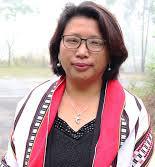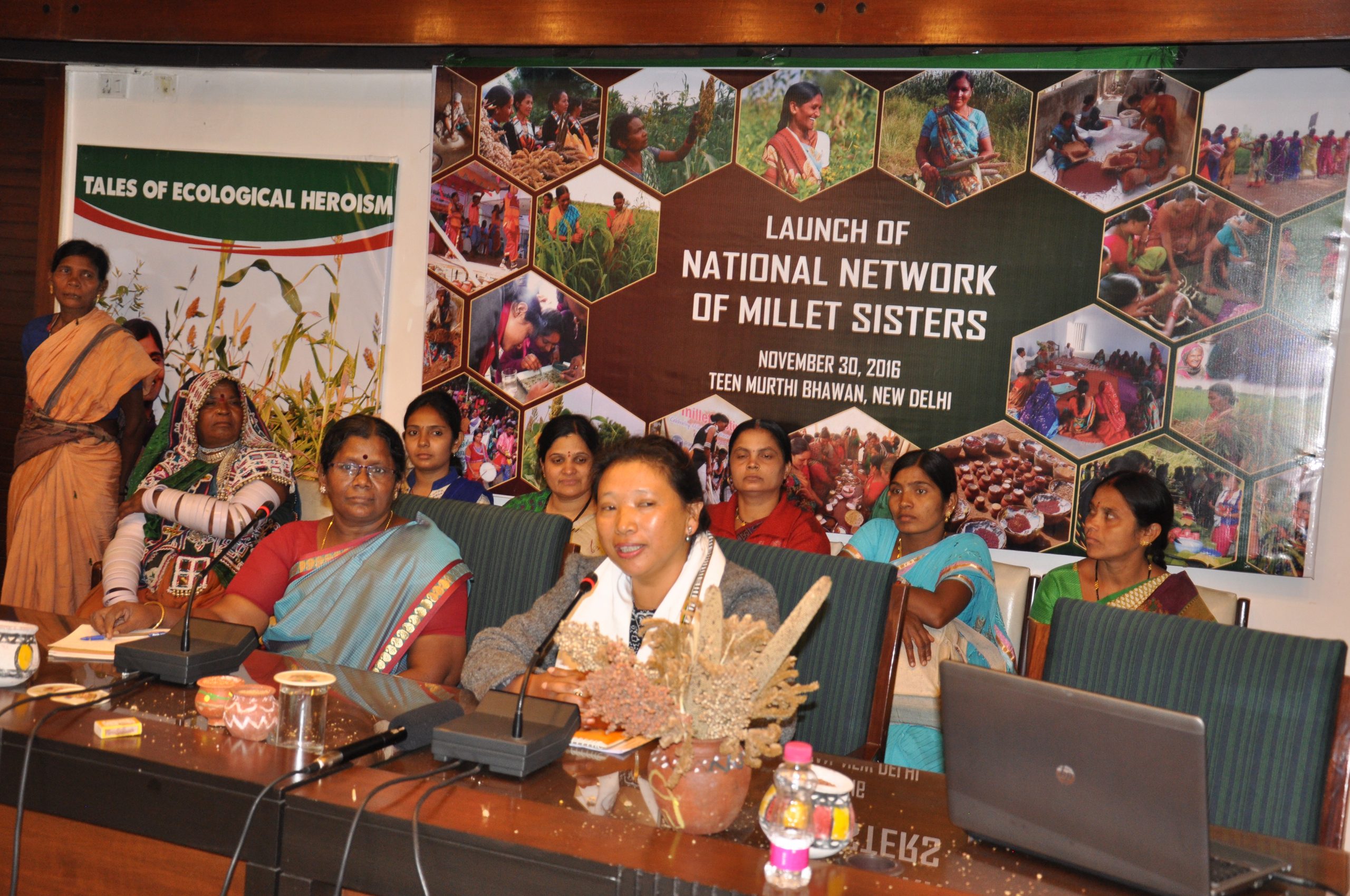Seno Tsuhah
Leader of grassroots women’s movement in Nagaland

Seno Tsuhah is a community development worker who holds over 23 years of experience working with the grassroot communities of Nagaland, particularly women. Her engagement with gender rights issues range from strategic policy advocacy with village institutions, state, regional, and national networks, cultural & environmental audio-visual documentation and enabling women farmers strengthen their practice of ecological and sustainable farming.
How did your journey with the women’s rights movement in Nagaland and association with NEN begin?
My engagement with community development work started when I was a member of the Chizami Students Union. I was involved with the youth participating in activities like sanitation, cleanliness drives, tree plantations and literacy programmes.
After I finished my studies, I returned to the village and gradually got involved with the larger community – church, women society, etc. I heard about North East Network when I first met Monisha Behal, one of the founding members of North East Network, in 1996 at one of the training centres in Pfutsero. Her work with the grassroot women groups and her commitment towards pivotal issues such as reproductive health, livelihood, and social justice was inspirational. I deeply believe in the values and principles enshrined in NEN of Non-discrimination, respect for diversity, plurality and secularism, accountability, community participation and leadership, collective decision, and action through democratic processes. This made me embrace NEN in 1998; and thus, my journey of advocating for women’s rights began.
You have been advocating for mobilisation, awareness generation and strengthening of ecological farming practices for women farmers. What is the best way forward on this in the context of North East India, and specifically, Nagaland?
Similar to NEN’s mission, I also believe in organising and collectivising of women, uplifting their leadership and bringing in positive developments through collective decision making and actions. I feel that as we go along we must continue mobilising, organising, and strengthening the capacities of women and thereby mould a very strong network of changemakers. A solid network of women, youth and committee members must congregate to move forward. It is imperative for us to stay strong individually and as a group because feminist leadership is about changing oneself and then trying to steer the change in others. I feel that it is essential that one must remain deeply grounded in the principles of equality, justice, fairness, and compassion so that we can address crucial and contextual issues; for instance, in a rural setting- the context and the issues that one faces may be different from those of an urban dweller. Nonetheless, it is of utmost importance to ground ourselves in these principles and let them drive us forward in whatever we do.

Would you please tell us more about the participatory video hub in Chizami, Nagaland? How is it addressing and furthering the cause of women’s rights?
North East Network (NEN) uses Participatory Video (PV) as a tool to engage and mobilise communities for social transformation in Nagaland. It is to empower the community as it stimulates their participation in decision making at all levels. The NEN PV team (filmmakers) has taken a journey through these communities’ vast knowledge systems and lifestyles to document a series of films about their biodiversity, their relationship with nature, food & culture, etc. These films have been screened in the community to promote dialogue, educate, and influence. The journey for the women film makers has been a trans-formative one; through their films, they were able to amplify and illustrate the stories of their communities, especially those portraying the plight of the women. These film screenings have brought the community together to collectively understand issues, voice their concerns and inspire action.
Since the past year, the PV team has been focusing on documenting issues related to GBDVA, women’s participation in decision making, and women change makers, etc. Consequently, this has contributed more to the discourse on the women’s rights issues within the community. I am hopeful that it will amplify consciousness amongst the people about the urgent need for a gender just society.
We are facilitating a wider outreach by documenting the participatory video in our local dialect and then sharing it with the community people who speak and understand the ‘Khezha’ dialect- our mother tongue. Meanwhile, we have also documented the interviews of the individuals in the community on how they are responding to the COVID – 19 pandemic. Lots of the people were interviewed on how they are coping with the pandemic and how they have prepared themselves in response to it.
How do you feel NEN’s work has gained relevance with the ongoing COVID-19 pandemic in Nagaland?
NEN Nagaland has been working for the promotion and strengthening of women’s access to justice, autonomy & leadership in Natural Resource Management. We work around indigenous food and farming systems which involves reviving and restoring community-based knowledge systems that are rooted in food cultures, sustainable agriculture practices, seeds, handicrafts, etc. NEN has been promoting millet based Agro-biodiverse farming and also bringing women to the forefront of its programmes. This area of work gained much relevance during the pandemic as people appreciated the importance of restoring the ecosystem, and having local food security. Many people started farming and gardening as it was confirmed that the communities that grew their own food emerged the most resilient to the adversities. There was a lot of awareness raised by the women themselves who used technology to help others by reaching out to vendors and farmers, and sharing information about the COVID-19 related issues.
What changes have you witnessed in the last two decades of working to promote good governance, natural resource management and sustainable livelihood in Nagaland?
In our village, we have seen the women coming up in leadership roles in their own communities and taking up chief roles in the village development, along with participating in community bodies. The women have become more economically independent through the livelihood programs that we have been running. I have also seen women coming together and asking for entitlements as a group. I feel like the women are now better informed and taking leadership roles, even in small ways, because traditionally a woman’s place in the decision-making bodies is not really visible in the Naga society. However, there are some positive stories where women are making headway like in the Chizami village, there are now four female members in the decision-making councils. In some of the neighboring villages, one can witness the women assembling and taking up initiatives like setting up the community seed banks or influencing their own local village institutions like the village councils in deciding resources etc. In the last two decades, a lot of the youth who had been trained or been a part of our programs are doing quite well; some of them are doing extremely well in photography, some in arts, and some in sports. I have also kept notice on what they have done in the past 15 or 16 years and some of them are doing exceedingly well in various projects. The youth development has also been supplemented with wage parity between the two sexes with men and women being paid equally for equal labor and enhancement of livelihood opportunities through such programs.
What advice would you give to the upcoming generation of women leaders and changemakers?
We must carry on with our struggles to fight for gender equality in an egalitarian society, where there is respect for everyone, by challenging the structural barriers. I think we need to start by modifying ourselves and then, making an effort to inspire and change others, as well. We must be the change we want to see. If I stand for something, it needs to be for the whole community. One must be grounded on the universal principles and values such as dignity, fairness, justice, compassion, equity, etc., for oneself and the others around you.
——————————————————————————-
Seno Tsuhah is a recipient of the ‘Stree Shakti Puraskar’(2004) conferred by the Government of India, Ministry of Women and Child Development for her contribution to women’s empowerment and development in difficult situations, and the Governor’s Commendation Certificate for Social Work in January 2017. She also received the Peace Award 2020 by Peace Channel, and Balipara Foundation Naturenomics Award in 2020.






